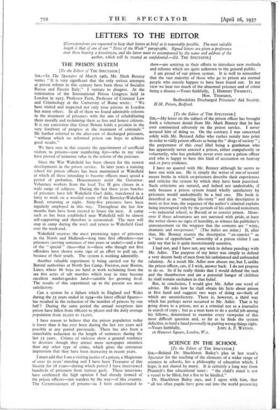THE PRISON SYSTEM
LETTERS TO THE EDITOR
[Correspondents are requested to keep their letters as brief as is reasonably possible. The most suitable length is that of one of our " News of the Week" paragraphs. Signed letters are given a preference over those bearing a pseudonym, and the latter must be accompanied by the name and address of the author, which will be treated as confidential.—Ed. THE SPECTATOR.] [To the Editor of THE SPECTATOR.] SiR,—In The Spectator of March 59th, Mr. Mark Benney writes " It is very significant that the only serious attempts at prison reform in this century have been those of Socialist Russia and Fascist Italy." I venture to disagree. At the termination of the International Prison Congress held in London in 5925, Professor Ferri, Professor of Criminal Law and Criminology at the University of' Rome wrote : " We have visited and inspected not only your prisons in London but many others. In all of them we found admirable reforms in the treatment of prisoners with the aim of rehabilitating them morally and reclaiming them as free and honest citizens. It is my conviction that Great Britain holds a position in the very forefront of progress in the treatment of criminals." He further referred to the after-care of discharged prisoners, " without which no reformed prison can hope to achieve good results."
We have seen in this country the appointment of unofficial visitors to prisons—now numbering 650—who in my view have proved of immense value in the reform of the prisoner.
Since the War Wakefield has been chosen for the newest developments in the prison service. In later years a training school for prison officers has been maintained at Wakefield at which all those intending to become officers must spend a period of probation. Housemasters assist the Governor. Voluntary workers from the local Toc H give classes in a wide range of subjects. During the last three years batches of prisoners have left Wakefield Gaol daily, transferred in a lorry to work on a wooded estate off the Barnsley-Wakefield Road, returning at night. Sixty-five prisoners have been regularly employed in this way. Throughout the last few months huts have been erected to house the men. A camp such as has been established near Wakefield will be almost self-supporting and therefore is economical. The men will stop in camp during the week and return to Wakefield Gaol over the week-end.
Wakefield receives the most promising types of prisoners in the North and Midlands—long time first offenders—star prisoners (serving sentences of two years or under)—and a few of the " special " class—that is—those who though not first offenders have shown some sign of an effort to pull up, or because of their youth. The system is working admirably.
Another valuable experiment is being carried out by the Borstal authorities at North Sea Camp, Freiston, near Boston, Lines, where 86 boys are hard at work reclaiming from the sea 600 acres of salt marshes which may in time become excellent market-garden land—suitable for growing food. The results of this experiment up to the present are most satisfactory.
Can a system be a failure which in England and Wales during the 25 years ended in 1934—the latest official figures— has resulted in the reduction of the number of prisons by one half ? During the same period the annual receptions into prison have fallen from 186,000 to 56,000 and the daily average population from 20,000 to 12,000.
I have reason to believe that the prison population today is lower than it has ever been during the last Soo years and possibly at any period previously. There has also been a remarkable reduction in the length of sentences during the last 25 years. Crimes of violence show a general tendency to decrease though they attract more newspaper attention than any other type of crime, which gives the erroneous impression that they have been increasing in recent years.
I must add that I am a visiting justice of a prison, a Magistrate of over 20 years' standing and I have been Treasurer of this Society for 18 years—during which period I have interviewed hundreds of prisoners from various gaols. These interviews have confirmed the high opinion I had already formed of the prison officers—not warders by the way—of this country. The Commissioners of prisons—as I have endeavoured to
show—are untiring in their efforts to introduce new methods and reforms which are quite unknown to the general public.
I am proud of our prison system. It is well to remember that the vast majority of those who go to prison are normal people who merely happen to have been found out. In my view we hear too much of the abnormal prisoner and of crime being a disease.—Yours faithfully, J. HERBERT TWAMLEY,
Hon. Treasurer,






















































 Previous page
Previous page